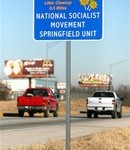
So said Woody Allen (as Isaac Davis in Manhattan) in response to the suggestion that a Nazi march was “devastated” by a mocking piece in the New York Times.
In Sunday’s Times, there was an article about a group calling themselves “The Nationalist Socialist Movement – Springfield Unit.” It has been allowed to participate in Missouri’s adopt-a highway program. Under the program, a group agrees to pick up trash along a stretch of roadside and, in return, a sign is erected at the onset of the “adopted” segment, acknowledging their participation. The Nazis apparently pick up litter in full regalia.
What to do? Allen’s character suggested picking up bricks and baseball bats and going to “really explain things to them.” Let’s take that off the table.
There is no question that the Nazis have a right to participate. The Supreme Court has held that groups may not be excluded from such programs on the basis of their political beliefs. That case (also arising from Missouri) involved adoption of a highway by the Klu Klux Klan. State officials responded by renaming the road after Rosa Parks.
Legislators have proposed calling the highway on which the Nazis collect trash, the Abraham Joshua Heschel Memorial Highway after the prominent rabbi and philosopher.Although Heschel’s daughter is not happy with the proposal (and her wishes are entitled to great consideration), I sort of like it. Absent the preferred option, i.e., that such people not exist, there is something about having Nazis pick up the garbage on what is, symbolically, a Jew’s road. “Excuse me, there, Horst, but I think you missed that Toblerone wrapper. Be a good little Aryan and pick that up for me.”
I appreciate that people will look at the propriety of such a response in different ways. One argument would be, I suppose, that to do anything more draws attention to the Nazis. But fanatics have a way of drawing attention to themselves. I prefer to see honoring Heschel in the face of these jamokes as the wages of hatred. The Nazis are marginalized and Heschel, who barely escaped the charnel house, is honored.
But this is the faculty blog so let’s explore a legal point.
Over at PrawfsBlawg, Helen Norton reprises an argument from one of her papers, suggesting that such programs are structured in a way that makes them a donation program in which the state may or may or not acknowledge participation. In that case, she says, the “government speech doctrine, i.e., the notion that government’s speech on its own behalf is exempt from first amendment scrutiny, would apply. She may well be right.
But should there be a first amendment limit on government speech? Might there be circumstances (not this case, for sure, I’m just using it as a jumping off point) where the government’s speech overwhelms the speech of others in a way that raises first amendment concerns?
It’s easiest to imagine the possibility in the context of an election. Imagine that the government chooses to conduct a massive public education campaign on, say, the value of a single payer health care system in the midst of an election where the issue is highly salient and divides the parties and presidential candidates. What if massive resources are brought to bear in response to protected speech, e.g., in response to a candidate’s criticism of the administration’s policies with respect to the detention and interrogation of suspected terrorists captured abroad, the government launches a WWII style propaganda campaign?
Of course, such propaganda campaigns existed and are not generally thought to present constitutional problems. The idea is that the remedy for speech that the public does not like is political.
But what if the government uses its unmatched resources to skew the political process?
